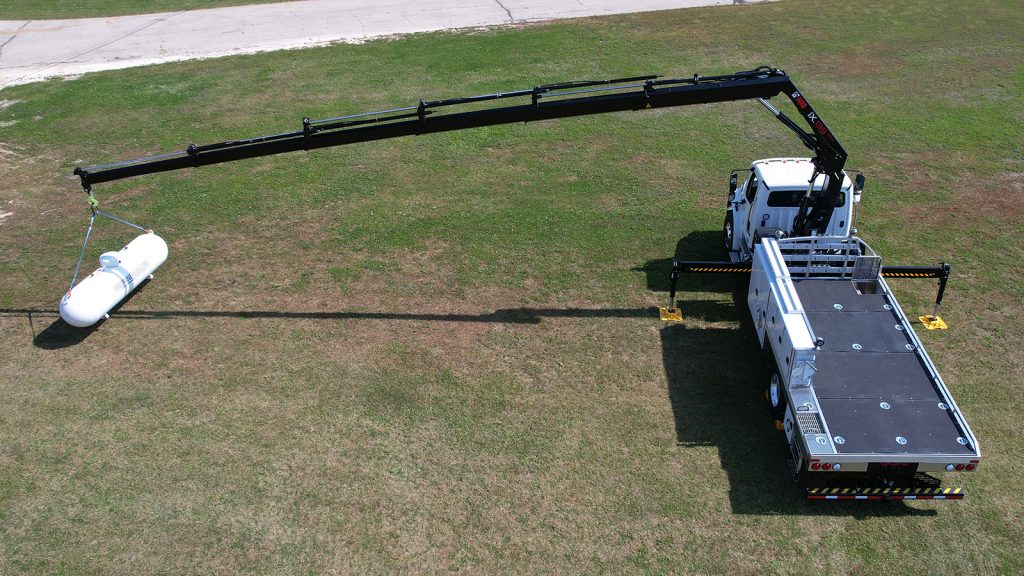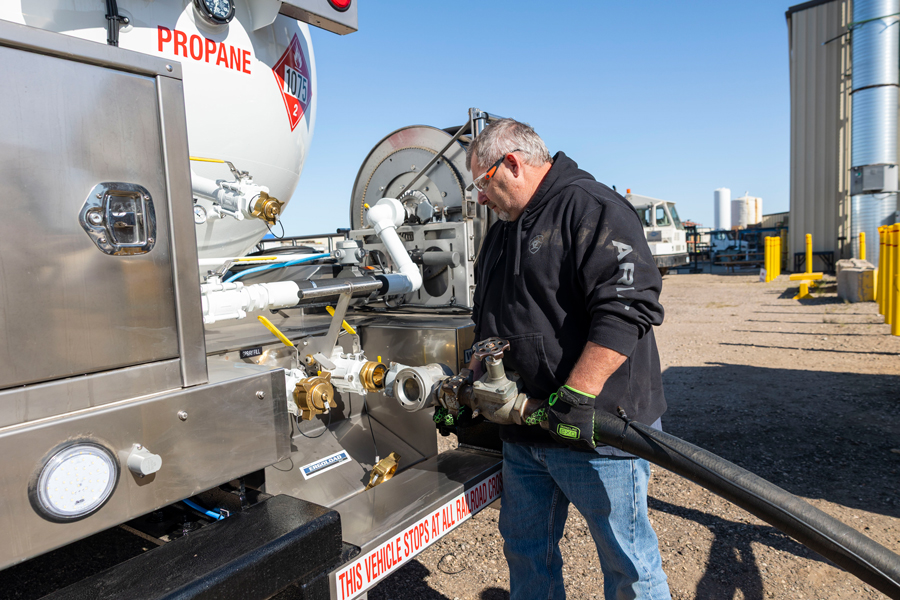
Your truck fleet is the lifeblood of your propane business, whether it’s your delivery trucks or installation and service rigs. Having rolling stock with larger capacities and more efficient features could be the answer to servicing more customers, especially when qualified drivers are in tight supply.
If you’ve been struggling with maintenance and repair issues for aging models, or trying to better manage route challenges, here are five reasons your business could benefit from upgrading one or more of your trucks.
1. Size up to better fit your needs
One way to improve driver and route efficiencies is to have trucks that can handle bigger tanks. “We’ve seen a lot of tank upsizing in recent years,” says Nathan Roberts, owner of Fisk Tank Carrier Co., based in Columbus, Wis., whose crane truck business is focused on meeting the needs of propane service and installation companies. “Most of the trucks we sell now have to handle 1,000-gallon tanks. We’ve even built one that could carry two of those tanks at a time. In helping a customer, we always start with tank size and build out from there.”
Fisk offers four truck body types: knuckle boom; stick boom; long-range, high capacity; and dual industry service units. “Chassis options are available from all manufacturers, or we’ll work with one that the customer supplies,” says Roberts. “We recommend customers choose their chassis based on payload and not necessarily by brand.”
He says they’re seeing a bit more demand for gasoline-powered engines, due to the typically higher cost of maintenance of diesel engines. “There’s also more interest in a dual-fuel option that allows for propane power. With conversion systems that are plug-and-play now, that’s becoming a logical choice.”
Bobtails have gotten bigger too, says Mike Hennen, general manager of Westmor’s truck and trailer division. “While 3,400-gal. tanks are a common size for many propane delivery trucks, we’re equipping more with 5,300-gallon and even 6,400-gallon tanks.”
To help customers choose the right tank size, the Minnesota-based company’s sales team ask a lot about the customer’s operation, says Brady Griffith, regional sales manager. “We look at who and where they deliver to and how many gallons they move. Then we help find the truck model, size and features that best fit their needs.”
2. Get the latest crane technologies
Fisk offers both articulated and stick boom crane trucks and incorporates the latest technologies into their designs, for maximum productivity and user safety. Articulated, or knuckle, booms are ideal for working in tight spaces due to their precision and maneuverability, says Roberts. “Our knuckle boom automatically unfolds and folds so you’ll never hit the truck cab.”
He adds that certain knuckle booms now come with telematics that provide real-time warnings of operational errors or safety issues.
The company’s stick boom trucks allow operators to lower tanks straight down, he says. “The type of boom a customer chooses usually depends on which one they’re more comfortable with and the conditions they work in.”
3. Customize for more convenience.
Both Hennen and Roberts emphasize the importance of being able to customize trucks to fit how and where customers work. “Our units are really designed by the customer to match their work processes,” says Roberts. “We’ve definitely seen the need for more storage, and we offer a variety of compartment sizes and configurations for side, under-body and above-cab storage, all with LED lighting options. We were also the first to develop a fitting station to hold everything needed for propane installation and repairs.”
Some of their more popular options include side-opening or top-rising storage box doors, Krug pumps, holders for poly rolls and cones, and a variety of rail options. “We’re always working to improve our trucks and add features our customers ask for. Currently we’re putting the finishing touches on a new poly box for our stick boom trucks,” says Roberts.
4. Customizing bobtails to maximize delivery efficiencies.

At Westmor, on-site manufacturing and fabrication facilities allow for full truck customization and the ability to take advantage of the latest in truck technologies. The most common custom features include the company’s Ergoload® deck design which allows easier and more ergonomic access to spray-fill and vapor-return connections, their Pathway™ swiveling hose reel, and a pump-flow stabilization feature available on several of its pump systems to increase flow rates in cold environments. “Our dual delivery system, with two hose reels, offers flexibility when delivering to a mix of customers on a driver’s route,” adds Hennen. “It can help a driver service more customers in a day.”
A very knowledgeable customer service team is a key part of the company’s product support, adds Griffith. “Someone on staff will always answer the phone and be able to help customers troubleshoot issues or quickly get the service they need. We have our own in-house engineers, we test all units before they go out, and we can even pull up specific plans for each truck we’ve built when we’re talking to customers.”
5. Keep and attract new drivers.
“New, up-to-date rigs are rolling billboards for your company,” says Roberts, “but they also can help attract and retain good employees. New equipment that not only looks good but allows employees to work more efficiently and safely can help make them feel good about the work they do and the company they work for. And with today’s shortage of qualified truck drivers, that’s an important consideration.”
Hennen and Griffith both note they have seen a trend towards drivers being more involved in the truck buying process. Westmor customizes the bobtail unit to meet the needs and preferences of the driver and operation.
To learn more about the latest truck builds, equipment options, and innovations in crane and bobtail design, tune into a CHS webinar on Thursday, November 13 at 1 pm CST. The session will feature expert insights and practical guidance to help propane professionals explore vehicle configurations, customization strategies, and operational efficiencies. Register for the webinar.
For other questions regarding partnering with CHS Propane call 1-800-852-8184.
